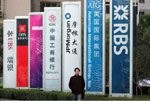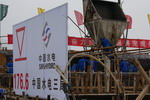SAIC, GM tie up in electric car venture
Updated: 2011-09-21 07:48
By Li Fangfang (China Daily)
|
|||||||||||
SHANGHAI - SAIC Motor Corp, China's biggest automaker by revenue, signed an agreement with US vehicle giant General Motors Co (GM) on Sept 20 to develop a new architecture, or production platform, for electric vehicles in China.
The move is expected to help them capture a place in a market with great potential for electric vehicles.
Under the agreement, the Shanghai-based Pan Asia Technical Automotive Center, an engineering and design joint venture between SAIC and GM, will serve as the global development center. Joint teams will also cooperate on the development of key parts and vehicle structures.
SAIC and GM are making an equal investment in the project. The financial details have not been announced.
The cooperation will leverage SAIC's market knowledge and local expertise along with GM's expertise in electric vehicle development and global know-how. It will ensure local input in the development of electric vehicle technology and the delivery of products developed in China.
The vehicles will first be sold in China under Shanghai GM and SAIC brands. The two companies will also use the architecture to build electric vehicles worldwide.
They said product details and the timing will be announced later.
Earlier this year, Gan Pin, the manager of SAIC's new-energy vehicle division, told China Daily that SAIC will start selling mass-produced pure-electric minicars to individuals under its homegrown Roewe brand next year, and a mass-produced fuel-cell model in 2015.
GM took a step forward in the sector with its Chevrolet Volt extended-range electric vehicle, which is entering the final stage to be mass-produced for individual use.
"Our agreement will enable SAIC and GM to take advantage of economies of scale and get new technology to the market faster than by going it alone," said Chen Hong, president of SAIC. "It will help bring about our goal of leading the automotive industry in new-energy vehicles."
"The development of this electric vehicle architecture demonstrates the broad range of benefits made possible by the strong partnership between SAIC and General Motors," said Tim Lee, president of GM's international operations.
According to Lee, the move expands the two companies' 15-year partnership on 10 joint ventures. It builds on their strategic cooperation in developing Asian markets, starting with India in late 2009, and their partnership last year on the development of the fuel-efficient small-engine family and advanced transmission, sharing the intellectual property rights worldwide.
Analysts said that the introduction of roadworthy technologies is more important than ever because China and other countries have announced stricter regulations to control car exhaust emissions and fuel consumption.
China, the world's biggest automobile market, plans to become a leader in the new-energy vehicle sector in the next 10 years, with government funding of 100 billion yuan ($15.67 billion). By 2020, it aims to have sales of 5 million new-energy vehicles.
Under the country's 12th Five-Year Plan (2011-2015), China intends to have a production capacity of 1 million new-energy vehicles, with pure-electric and plug-in hybrid vehicles accounting for 50 percent.
German automaker Daimler AG signed an agreement with Chinese battery and car maker BYD Co Ltd last year to form a 600-million-yuan equal joint venture to develop new brand for electric vehicles for the Chinese market. The first model is expected to be launched in 2013.
Related Stories
SAIC Aug auto sales up 14% y-o-y 2011-09-07 14:57
SAIC restructuring plan approved 2011-08-04 10:30
SAIC 'ready' to pare stake in GM unit 2011-09-02 14:59
GM slashes prices to maintain lead in Chinese market 2011-08-30 09:39
- China seen through 'colored lens': Diplomat
- ICBC Leasing plans major fleet expansion
- Debt crisis may cause more trade friction
- Central SOEs net profits up 13.1% in Jan-Aug
- China's 2011 growth at 9.5%: IMF
- Falling euro to hit China's exports
- CISA to publish iron ore price index
- Chinese investors 'can help create jobs' in the US













